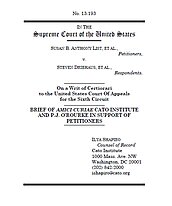Susan B. Anthony List v. Driehaus
Learn more about Cato’s Amicus Briefs Program.
If you only read one Cato brief this Supreme Court term, it should be this one. Believe it or not, it’s illegal in Ohio to lie about politicians, for politicians to lie about other politicians, or for politicians to lie about themselves. That is, it violates an election law—this isn’t anything related to slander or libel, which has higher standards of proof for public figures—to make “false statements” in campaign-related contexts. During the 2010 House Elections, a pro-life advocacy group called the Susan B. Anthony List (SBA List), published ads in Ohio claiming that then-Rep. Steven Driehaus, who was running for re-election, had voted to fund abortions with federal money (because he had voted for Obamacare). Rather than contesting the truth of these claims in the court of public opinion, Driehaus filed a complaint with the Ohio Election Commission (OEC) under a state law that makes it a crime to “disseminate a false statement concerning a candidate, either knowing the same to be false or with reckless disregard of whether it was false.” While the complaint was ultimately dropped, the SBA List took Driehaus and the OEC to federal court, seeking to have this law declared unconstitutional and thus enable advocacy groups to have more freedom going forward. The case has now reached the Supreme Court. Joined by legendary satirist P.J. O’Rourke, Cato’s brief supports the SBA List and reminds the Court of the important role that “truthiness”—facts you feel you in heart, not in your head—plays in American politics, and the importance of satire and spin more broadly. We ask the Court a simple yet profound question: Doesn’t the First Amendment’s guarantee of free speech protect one man’s truth even if it happens to be another man’s lie? And who’s to judge—and on what scale—when a statement slides “too far” into the realm of falsehood? However well intentioned Ohio legislators may have been, laws that criminalize “false” speech don’t replace truthiness and snark with high-minded ideas and “just the facts.” Instead, they chill speech, replacing the sort of vigorous political dialogue that’s at the core of the democratic process with silence. The Supreme Court of all institutions should understand that just because a statement isn’t fully true, that doesn’t mean it doesn’t have its place in public discourse. Moreover, pundits and satirists are much-better placed to evaluate and send-up half-truths than government agencies.

This work is licensed under a Creative Commons Attribution-NonCommercial-ShareAlike 4.0 International License.
